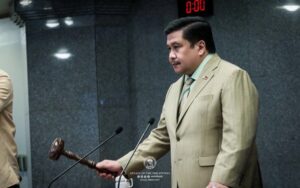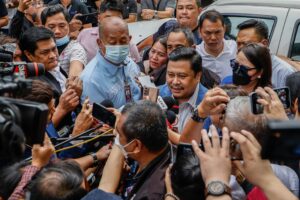MANILA, Philippines – The long-running legal battle involving Senator Jinggoy Estrada and the notorious Priority Development Assistance Fund (PDAF) scam has reached a critical juncture. On Wednesday, October 29, the Supreme Court (SC) of the Philippines delivered a definitive ruling, dismissing the Senator’s petition to fully dismiss the graft charges pending against him before the Sandiganbayan, the nation’s anti-graft court.
The High Court’s decision, penned by Associate Justice Maria Filomena Singh, effectively ensures that Estrada will continue to face trial on multiple counts of graft, even following his recent acquittal on the more severe charge of plunder. This legal pronouncement reaffirms the principle that violations of the Anti-Graft and Corrupt Practices Act can be prosecuted independently of the Anti-Plunder Law.

The SC’s Rejection of the ‘Absorption’ Principle
Senator Estrada’s legal strategy rested on the contention that his graft charges, filed under Section 3(e) of Republic Act No. 3019 (Anti-Graft and Corrupt Practices Act), should be considered ‘deemed absorbed’ by his plunder charges under Republic Act No. 7080 (Anti-Plunder Law). Had the SC granted this petition, the acquittal on the plunder charge would have simultaneously cleared him of the corresponding graft offenses.
The Supreme Court, however, staunchly rejected this argument in its decision on the Petitions for Certiorari (G.R. Nos. 228374-84). The ruling established a clear demarcation between the two distinct crimes.
The SC provided a detailed explanation of the differences between the two anti-corruption statutes, dismantling the ‘absorption’ theory:
Graft (RA 3019, Sec. 3(e)): This offense is committed when a public officer, in the discharge of official functions, gives any private party any unwarranted benefit, advantage, or preference, causing undue injury to the government. Crucially, the benefit or advantage is given to a private individual separate from the public officer.
Plunder (RA 7080): This is the high crime of accumulating or acquiring ill-gotten wealth through a “combination or series of overt criminal acts.” In this instance, it is the public officer who directly benefits by receiving kickbacks or unjustly enriching himself/herself through the commission of the predicate crimes.
The Court further clarified that the absorption principle—where one offense merges into another—“does not apply between graft and plunder,” except in extremely rare cases where the same public officer is simultaneously the “giver and recipient of the unwarranted benefit.” This legal distinction fundamentally affirms that violations of Republic Act No. 3019 may be prosecuted separately from plunder, regardless of the outcome of the plunder case.
This ruling holds immense significance for future anti-corruption cases, solidifying the prosecution’s ability to pursue multiple, simultaneous charges against officials implicated in large-scale corruption schemes.
The Long Shadow of the Pork Barrel Scam

The cases against Estrada stem from the massive PDAF (Priority Development Assistance Fund) scam, orchestrated by businesswoman Janet Lim Napoles, who earned the moniker “pork barrel scam queen.” The prosecution had alleged that Estrada amassed ill-gotten wealth amounting to P183,793,750.00 through commissions and kickbacks generated by transacting with Napoles.
Estrada was originally indicted for one count of plunder and eleven counts of graft. The graft charges specifically relate to the alleged misuse of P255,114,000 drawn from his legislative discretionary funds and channeled through various non-governmental organizations (NGOs) linked to Napoles.
A Triumphant, Then Overturned, Acquittal
The trajectory of Estrada’s legal proceedings has been tumultuous. In January 2024, the Sandiganbayan initially acquitted him of the plunder charge, a moment of significant political relief for the Senator. However, the anti-graft court delivered a complex ruling, simultaneously convicting him of one count of direct bribery and two counts of indirect bribery.
That conviction, however, proved short-lived. In an unexpected reversal, the Sandiganbayan Special 5th Division later granted Estrada’s motion for reconsideration in a decision promulgated in August of the same year, ultimately clearing him of all bribery convictions as well. This final acquittal on the most serious charges brought against him was the subject of much legal and political commentary, prompting extensive analysis on the court’s shift in judgment.
The Senator, apart from the legal challenges surrounding the graft charges, had also challenged his plunder case at the Supreme Court through separate petitions for certiorari.
Mootness on Plunder, Continuation on Graft
The Supreme Court addressed Estrada’s plunder-related petitions (G.R. Nos. 236268, 249919 and 254892) by declaring them moot and academic.
The SC stated that it “took judicial notice of the Sandiganbayan Decision, dated January 19, 2024, acquitting Senator Estrada of the plunder charges,” which effectively rendered the SC petitions irrelevant as the primary relief sought—acquittal—had already been granted by the lower court.
With the plunder charge resolved (acquitted) and the challenge to the graft charges dismissed (rejected), the focus now returns squarely to the Sandiganbayan, where Estrada must face trial on the remaining eleven counts of graft.
The Last Man Standing

Senator Estrada’s ongoing legal entanglement distinguishes him from the other two biggest names implicated in the PDAF scandal who faced similar plunder and graft charges: Chief Presidential Legal Counsel Juan Ponce Enrile and former senator Bong Revilla.
The legal landscape for the others has completely cleared:
Bong Revilla: Was acquitted of plunder by the Sandiganbayan in December 2018.
Juan Ponce Enrile: Recently secured his own acquittal from his remaining graft cases on October 24, having already been cleared of the more serious plunder charges.
With both Enrile and Revilla now having been cleared in all their respective PDAF cases, Senator Estrada remains the only high-profile figure from the original group who continues to face trial at the Sandiganbayan.
This continuation of the graft trial underscores the SC’s strong message: even if the stringent elements required for a conviction on plunder—the systematic amassing of wealth—are not met, officials may still be held criminally liable for the specific acts of corruption, such as “giving any private party any unwarranted benefit,” which falls under the distinct and separate jurisdiction of the Anti-Graft Law.
The trial is set to proceed, ensuring that accountability for the alleged misuse of over a quarter billion pesos in public funds remains an active part of the nation’s legal narrative.





